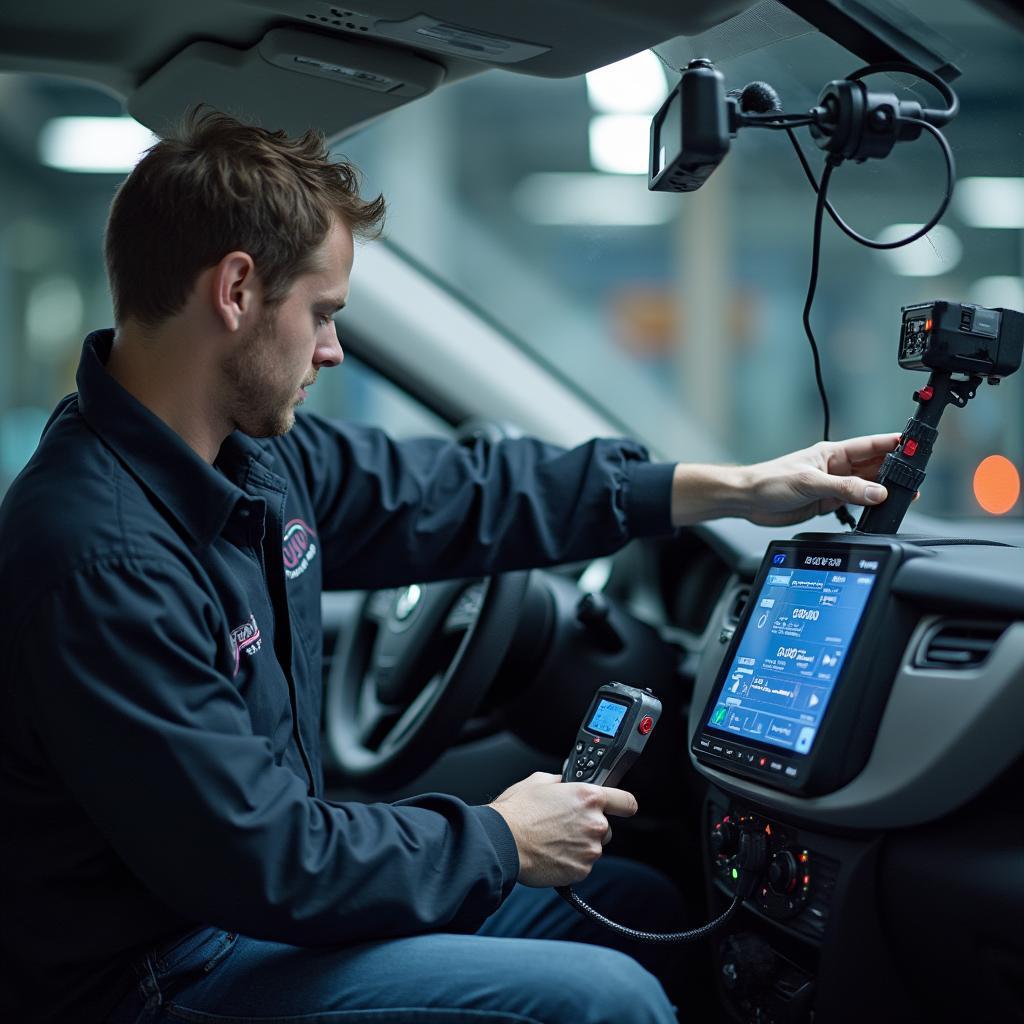The auto service industry is constantly evolving, with new technologies and techniques emerging all the time. To stay ahead of the curve and deliver exceptional customer service, Auto Service Team Training is not just an option, it’s a necessity. Investing in your team’s knowledge and skills is investing in the long-term success of your business.
Why is Auto Service Team Training Crucial?
A well-trained auto service team is the backbone of any successful shop. Here’s why:
-
Improved Technical Skills: Regular training ensures your team stays up-to-date on the latest technologies, diagnostic procedures, and repair techniques. This translates to faster, more efficient service and fewer comebacks.
-
Enhanced Customer Service: Training programs can equip your team with the communication and interpersonal skills needed to provide excellent customer service. Knowledgeable and friendly staff build trust and loyalty among your clientele.
-
Increased Efficiency and Productivity: When your team is well-versed in the latest tools and techniques, they can work more efficiently, diagnose problems faster, and complete repairs more quickly. This boosts productivity and allows you to serve more customers.
-
Reduced Errors and Liabilities: Comprehensive training minimizes the risk of costly mistakes and potential liability issues. A well-trained team understands and follows safety protocols and industry best practices, protecting your business and its reputation.
-
Boosted Employee Morale and Retention: Investing in training shows your employees that you value their growth and development. This fosters a positive work environment, increases job satisfaction, and improves employee retention rates.
Key Areas for Auto Service Team Training
Effective training programs should encompass various aspects of the auto service industry. Here are some key areas to focus on:
1. Technical Training:
-
Vehicle Electronics and Diagnostics: Modern vehicles are equipped with complex electronic systems. Training should cover diagnostics tools, software, and troubleshooting techniques for various electronic components.
-
Advanced Driver-Assistance Systems (ADAS): ADAS features like lane departure warning, adaptive cruise control, and automatic emergency braking require specialized knowledge and calibration procedures.
 Auto service team training: ADAS calibration
Auto service team training: ADAS calibration
-
Hybrid and Electric Vehicle Technology: As the demand for eco-friendly vehicles rises, so does the need for technicians skilled in hybrid and electric vehicle repair and maintenance.
-
Diesel Engine Technology: Diesel engines, particularly in heavy-duty vehicles, require specialized knowledge and skills. Training should cover engine components, fuel systems, emissions control, and diagnostic procedures.
2. Customer Service Training:
-
Effective Communication: Train your team to communicate clearly and empathetically with customers, explaining technical details in a way that is easy to understand.
-
Conflict Resolution: Equip your team with the skills to handle challenging customer interactions professionally and find amicable solutions to any issues that may arise.
-
Building Rapport and Trust: Encourage your team to build rapport with customers by actively listening, addressing their concerns, and providing transparent explanations of services and pricing.
3. Business and Management Training:
-
Service Writing and Estimating: Accurate and efficient service writing is crucial for profitability. Training should cover industry best practices, software utilization, and effective communication with customers.
-
Inventory Management: Proper inventory management ensures you have the necessary parts and supplies on hand while minimizing waste and controlling costs.
-
Marketing and Customer Retention: Train your team on basic marketing principles and customer retention strategies to help grow your business and build a loyal customer base.
Implementing a Successful Auto Service Team Training Program
- Assess Training Needs: Identify the specific skill gaps within your team and tailor your training program accordingly.
- Set Clear Objectives: Define what you aim to achieve through training, whether it’s improving technical skills, enhancing customer service, or boosting efficiency.
- Choose the Right Training Methods: Explore various options, such as online courses, in-person workshops, manufacturer-specific training, and on-the-job mentoring.
- Allocate Resources Effectively: Invest in quality training materials, qualified instructors, and dedicated time for employees to participate in training sessions.
- Evaluate and Improve: Regularly assess the effectiveness of your training program and make adjustments as needed to ensure it meets your team’s evolving needs and aligns with industry trends.
Investing in the Future of Your Auto Service Business
In today’s competitive auto service industry, a commitment to ongoing auto service team training is essential for success. By investing in your team’s skills and knowledge, you not only enhance their performance but also demonstrate your commitment to providing exceptional service to your valued customers. This dedication to continuous improvement will set your business apart and drive long-term growth and profitability.
FAQs about Auto Service Team Training
1. How often should auto service teams receive training?
Ideally, training should be an ongoing process. However, at a minimum, teams should participate in training programs at least once a year to stay current with industry advancements.
2. What are some reputable sources for auto service training?
Reputable sources include:
- Auto Pedigree Customer Service
- Manufacturer-specific training programs
- Industry associations like the National Institute for Automotive Service Excellence (ASE)
- Community colleges and technical schools
3. How can I measure the effectiveness of my team’s training?
You can measure effectiveness through:
- Improved customer satisfaction scores
- Increased productivity and efficiency metrics
- Reduced error rates and comebacks
- Employee feedback and assessments
4. What are the benefits of manufacturer-specific training?
Manufacturer-specific training provides in-depth knowledge and skills related to a particular vehicle make and model. This is especially valuable for technicians working with complex technologies and systems.
5. How can I encourage my team to embrace ongoing training?
- Emphasize the value of training for their career growth and job security.
- Provide incentives for completing training programs and earning certifications.
- Create a positive and supportive learning environment.
Need help finding the right training solutions for your auto service team? Contact us today! WhatsApp: +1(641)206-8880, Email: [email protected]. Our team is available 24/7 to assist you.


